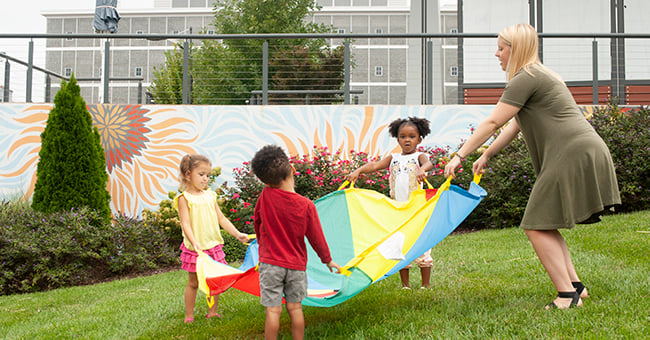
In the second installment of her series, Nurture in Nature, Dr. Rachel A. Larimore champions the importance of diversity, equity, and inclusion in outdoor play.
Children have a right to play. This includes outdoor play. For some, this may seem like a radical notion but, the fact is, humans—including children—are hardwired to need nature in our lives. Ultimately, we are animals part of the natural world who have an innate need for a connection to nature and living things. This is what E.O. Wilson calls the "biophilia hypothesis." This means no matter a child's race, ethnicity, gender, or ability they have a right to experience outdoor play and nature–based learning. It's our role as adults to do the work of diversity, equity, and inclusion to ensure they have safe, meaningful experiences in the outdoors.
The work of diversity means recognizing and honoring that every child has had different experience and, as a result, different comfort levels with the natural world. This includes recognizing a range of experiences with nature from a place of extensive recreation to a place of generational trauma that still weighs heavy. Our job as educators is to recognize where children and families are in their outdoor journey and start there.
Then comes the work of equity, which means not only recognizing where children are, but working to remove the barriers that stand between them and positive outdoor experiences. The purpose of outdoor play isn't to create the next mountaineers to climb Denali, but rather to provide a quality of life that comes from our need for connections to nature and other living things. So, what are the barriers keeping children from experiencing these outdoor experiences?
The barriers between children and outdoor play are almost always the result of the adults in their lives. One potential barrier to outdoor and nature–based play is how we define "nature." It's important that we take a broad view of what counts as nature and recognize children in urban and suburban areas have the same right to outdoor experiences as those living in rural areas. Yes, the experiences will be different, but nature exists even in the most urban areas. In fact, it's in urban areas where we see plants and animals living despite human impact. For example, birds still find ways to build nests and raise their young on skyscrapers!
Another barrier is our own ideas about cultures and who does or doesn't like nature. People of all races, ethnicities, genders, abilities, and so forth enjoy time outdoors. Again, it's hardwired into us! Yes, we have to recognize every individual has had different experiences with the outdoors. But, at the same time, making blanket statements about certain groups not being "outdoorsy" immediately takes away a vital part of their humanity—their right to experience the beauty, joy, and wonder of the natural world. We can disrupt some of the stereotypes around who is an outdoorsperson by thinking about representation. Are different races represented in storybooks about nature? Genders? Abilities? And in asset-based ways?
In addition to the mindset shift about what counts as nature and who is or who isn't outdoorsy are a variety of more tangible barriers. These barriers might be related to economics, such as lack of clothing to be outside in all weather, or different abilities related to moving across rugged terrain. These and many other barriers can be overcome through the work of inclusion.
Inclusion requires taking action every day to ensure we are removing barriers between children and nature—and definitely not creating barriers! Adults in the early childhood classrooms serve as the gatekeepers standing between children and the natural world. Our job is to act, every day, to ensure we are giving children opportunities to experience the outdoors in a way that supports each child and their individual needs.
Whatever different identity markers a child has, they have a right to play and, it is the role of the adults in their life to ensure they can experience the many benefits of outdoor play. Every child deserves to experience, through the magic of play, the beauty, wonder, and enormity of the natural world and connect to something bigger than themselves.
About the Author
Rachel A. Larimore, Ph.D., is an educator, speaker, consultant, and author. Her work focuses on the intentional integration of nature into early childhood education so young children learn with nature to expand their worlds and live rich, full lives. She has written three books including Establishing a Nature-Based Preschool and Preschool Beyond Walls: Blending Early Childhood Education and Nature-Based Learning. Rachel is the founder and Chief Visionary of Samara Early Learning, an organization focused on helping early childhood educators start nature-based schools or nature-based approaches into their existing programs. Prior to Samara, she worked for 11 years as the founding director of a nature-based preschool in mid-Michigan.
Explore This Series
Nurture in Nature: Getting Started with Nature-based Learning
Nurture in Nature: Supporting School Readiness Through Outdoor Play
Nurture in Nature: Back-to-School Tips for Outdoor Play
